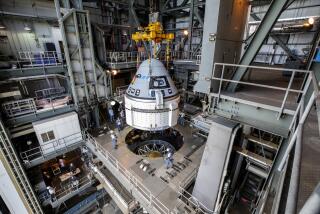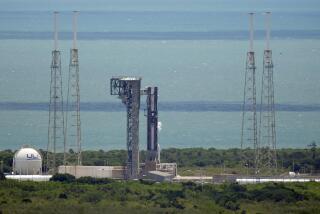Shuttle prepares for station backup role, just in case
- Share via
The shutdown of two key computers that control navigation and oxygen production on the Russian side of the International Space Station forced astronauts Thursday to turn off equipment in the docked shuttle Atlantis to conserve energy.
The measures were necessary to make sure Atlantis had enough power to stay at the station an extra day, if needed, to help with repairs.
NASA Associate Administrator William H. Gerstenmaier said Thursday that the situation was “stable” and engineers were nearing a solution.
“We’ve got a plan to go work the problem,” he said during a briefing Thursday at Johnson Space Center in Houston. “I don’t consider this critical.”
He added that the chances of the crew having to abandon the station were “extremely remote.”
Astronaut William Surles McArthur Jr., who spent six months on the station before returning to Earth last year, said the problem had to be solved before the shuttle undocked.
NASA officials said they suspected the computer problems were caused by a faulty power supply from a newly installed station truss.
Atlantis launched Friday on what was to have been an 11-day mission. The mission has already been extended two days for astronauts to repair a torn thermal blanket on the shuttle’s rear orbital maneuvering engines. Astronaut John “Danny” Olivas will try to staple down the 4-by-6-inch tear today.
The computer problems began Wednesday as the Atlantis crew was attaching a new truss to the starboard side of the station. The computers control the Vozdukh oxygen-generating system on the Russian side, as well as the small attitude-control rockets that help keep the station properly aligned as it orbits about 220 miles above Earth.
As the Russians struggled to bring their computers back online, fire alarms repeatedly rang throughout the station, causing occupants to scramble for fire extinguishers. Officials eventually realized the alarms were being caused by the malfunctioning computers.
Gerstenmaier said the Russians managed to reboot the computers and keep them working for seven minutes. That allowed the Americans to send through a command that helped stabilize power usage on the Russian portion of the station.
Throughout Thursday, the Russian crew members, Fyodor Yurchikhin and Oleg Kotov, and their ground controllers worked on the computer system, bringing it up momentarily, only to see it crash again.
When carbon dioxide began to build up on the Russian side, they turned on fans to help flush the air. The American side has an independent oxygen-generating system, which McArthur said was able to supply enough air for the Russians.
The station also carries a 56-day supply of oxygen in bottles.
The more immediate concern is station navigation. Without the Russian attitude-control rockets, the station needs Atlantis’ thrusters to realign it. Three gyroscopes keep the station properly oriented in space, but they can become overloaded and have to periodically go offline.
“This is a serious problem,” McArthur said. “The good news is, we’ve got the most impressive engineering team the world has ever seen working on it.”
He added: “Everybody on board is safe. We’ve got quite a few days to deal with the problem.”
And if worse came to worst, “everyone has a ride home.”
The station now has 10 people aboard -- the two Russians and their American crewmate, Sunita L. Williams, and the seven Atlantis crew members. A Soyuz spacecraft is also docked at the station, and it could provide room for the three space station crew members.
Most NASA officials were optimistic that the problems would be solved within the next couple of days.
“I fully expect we will sort this out,” said Michael T. Suffredini, the space station program manager.
He said the leading theory as to the cause was “noise” in the power line from the new station truss. The computers began acting up around the time the new power cables were connected.
Suffredini said the computers, which were built by DaimlerChrysler of Germany, were known to be sensitive to such noise.
To check that theory, power sources from the American side of the station will be disconnected in the morning, when the Russians try again to reboot.
McArthur said Atlantis had enough fuel for eight more days, if necessary.
“I don’t know if this is the biggest problem that ever struck the space station,” McArthur said. “But failure is not an option.”
More to Read
Sign up for Essential California
The most important California stories and recommendations in your inbox every morning.
You may occasionally receive promotional content from the Los Angeles Times.













